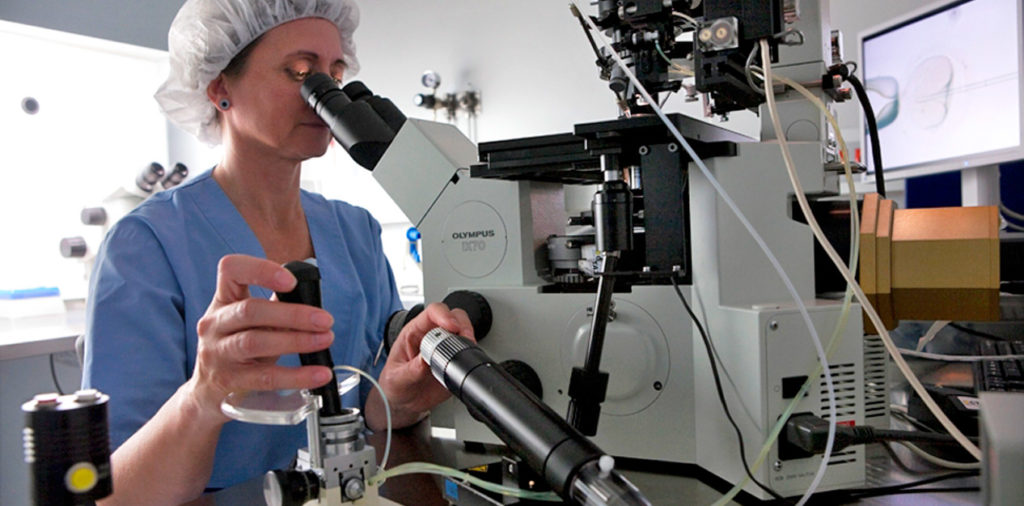
Although ICSI has meant a significant advance in the field of reproductive medicine in patients with male infertility problems, there is a certain disparity of opinions in the medical world about its use in other cases of infertility. For this reason, the journal Fertility and Sterility has collected the views of various experts on the subject.
Two professionals from Dexeus Mujer, Prof. Nikolaos Polyzos, head of the Reproductive Medicine Department, and Dr Ana Raquel Neves, have participated in this debate. Their contribution focuses on demystifying several concepts that are taken for granted regarding the indication of this technique. These are some of the myths exposed:
ICSI is indicated in women with low ovarian response:
Considering the poor prognosis of patients with low ovarian reserve, the concept that ICSI could improve success rates is appealing. However, all the evidence shows that applying this technique does not improve pregnancy rates in these cases.
ICSI is indicated for older women due to the lower quality of their eggs:
Current scientific evidence shows no difference in fertilisation rates or live-birth rates between ICSI and conventional in vitro fertilisation (IVF) in older women.
It is mandatory in patients undergoing preimplantation genetic diagnosis:
Despite the fear of possible contamination of the genetic material of the sperm with IVF, the available evidence shows that this risk is negligible. In fact, the available studies show similar results regarding the number of embryos available for biopsy and the rates of abnormal results for IVF and ICSI.
It should be the technique of choice for patients with unexplained infertility:
A meta-analysis concluded that the application of ICSI improved reproductive outcomes in patients with unexplained infertility. However, the heterogeneity of the trials included in the analysis, linked to limited patient samples and diversity in protocols, limits the interpretation of the results. Furthermore, randomised trials and large-scale observational studies do not show significant differences between ICSI and IVF for this group of patients.
It should be offered to patients who have had previous treatment with failed fertilisation:
The authors point out that, although in a context of previous treatment with failed fertilisation most clinicians recommend ICSI, it is important not to forget other potential causes of failed fertilisation.
All patients should receive combined insemination (IVF and ICSI) to minimise the risk of failed fertilisation:
In couples without male infertility, the incidence of failed fertilisation is low, and the available trials demonstrate similar results for IVF and ICSI. Furthermore, no differences have been found between the two techniques with regard to pregnancy rate.
Our team concluded that, although ICSI is a highly effective technique, it has been abused considering that clinical results do not confirm comparative improvements over conventional IVF in couples without male infertility.
Reference article:
Intracytoplasmic sperm injection for all or for a few?
Jason M Franasiak, Nikolaos P Polyzos, Ana Raquel Neves, John Liu Yovich, Tuong M Ho, Lan N Vuong, Robert J Norman.
Editorial: Fertil Steril. 2022 Feb;117(2):270-284.
doi: 10.1016/j.fertnstert.2021.12.001
DEXEUS CAMPUS
Gran Vía de Carles III 71-75
08028 Barcelona
campus@dexeus.com
(+34) 93 227 47 09
® Copyright 2021-2025 Dexeus Mujer Foundation – Gran Via Carles III 71-75. 08028 Barcelona. Spain
| Cookie | Duration | Description |
|---|---|---|
| cookielawinfo-checkbox-analytics | This cookie is set by the GDPR cookie consent plugin. The cookie is used to store the user's consent for cookies in the "Analytics" category. | |
| cookielawinfo-checkbox-functional | The cookie is set by the GDPR cookie consent to record user consent for cookies in the "Functional" category. | |
| cookielawinfo-checkbox-necessary | This cookie is set by the GDPR cookie consent plugin. Cookies are used to store the user's consent for cookies in the "Necessary" category. | |
| cookielawinfo-checkbox-others | This cookie is used by the GDPR component. It is used to store the user consenting cookies in the "Other" category. | |
| cookielawinfo-checkbox-performance | This cookie is set by the GDPR cookie consent plugin. The cookie is used to store the user's consent for cookies in the "Performance" category. | |
| elementor | ||
| viewed_cookie_policy | The cookie is set by the GDPR cookie consent plugin and is used to store whether or not the user has consented to the use of cookies. It does not store any personal data. |
| Cookie | Duration | Description |
|---|---|---|
| _icl_visitor_lang_js | To allow multi-language functionality for web content. | |
| wpml_browser_redirect_test | Used to verify if cookies are allowed in the browser. |
| Cookie | Duration | Description |
|---|---|---|
| _ga | The _ga cookie, installed by Google Analytics, calculates visitor, session and campaign data and also tracks site usage for the site's analytics report. The cookie stores information anonymously and assigns a randomly generated number to recognize unique visitors. The _ga cookie, installed by Google Analytics, calculates visitor, session and campaign data and also tracks site usage for the site's analytics report. The cookie stores information anonymously and assigns a randomly generated number to recognize unique visitors. | |
| _ga_1WD9MFDMJK | This cookie is installed by Google Analytics. |
| Cookie | Duration | Description |
|---|---|---|
| wp-wpml_current_language | Necessary for the operation of the website in the different languages |